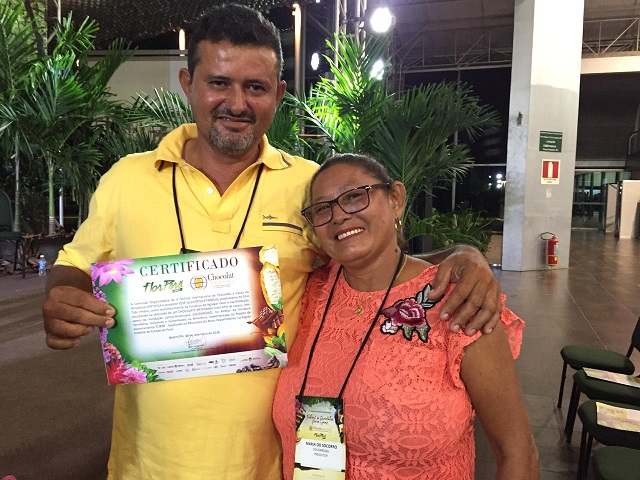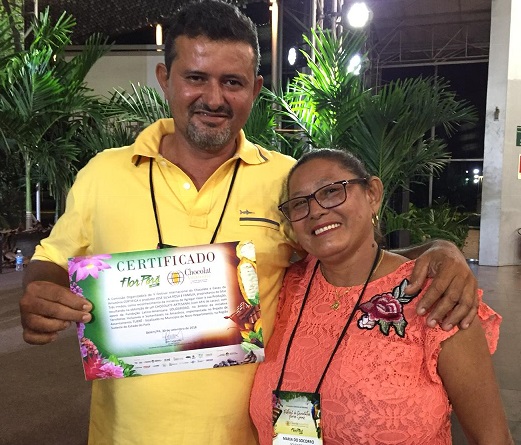Almost 95% of the global cocoa production lies in the hands of family farmers. This is one of the core messages from the Salon du Chocolat in Paris, which brings together recognized professionals and chocolate specialists from five continents to educate the public on making more informed and responsible decisions when buying chocolate.
José Silva Rosa, or Zezinho, is among the cocoa growers from Africa, Latin America and Asia who attended the event to present the cocoa beans from his homeland in the Amazon. He was selected by the Brazilian Executive Commission for Cocoa Cultivation Planning (CEPLAC) and Agricultural Development and Fisheries Secretariat of Pará (SEDAP) to attend the event due to having pioneered fermentation and storage techniques that Solidaridad promotes in the region for the production of high quality beans.
Zezinho’s beans journey from the Amazon to Paris
As part of its sustainable and inclusive landscape strategy in Novo Repartimento, Solidaridad is providing technical assistance in the field, as well as creating new sales opportunities to increase producer’s income. “We sent samples of beans from the Tuerê producers to the Cocoa Innovation Centre that did a sensorial analysis and identified Zezinho’s lot as the best one. Meanwhile, we contacted Bruno Lasevicius, a chocolatier from São Paulo, and sent him samples of Zezinho’s beans,” explained Paulo Lima, agricultural projects coordinator from Solidaridad in Brazil.
Lasevicius, who is part of the Bean-to-Bar movement, was surprised with the quality of the beans and acquired them to make homemade chocolate.
There are producers who work for generations with cocoa and can not gain the quality and results Zezinho achieved. In addition, the quality was maintained in the second batch, with results very similar to the first one. This is surprising because we know that currently the biggest problem for cocoa farmers is consistency. It was the first time I had a good experience with Amazon cacao. So I see a great potential in Solidaridad’s work in the region. – Bruno Lasevicius, Chocolatier from São Paulo

Zezinho and his mother receiving a distinction at the International Chocolate and Cocoa Festival of Amazonia. Credits: Carol Gutierrez
The Tuerê chocolate, made by Casa Lasevicius, was recognized at the blind tasting of national beans at the Bean to Bar Chocolate Week 2018, held in São Paulo in May. Zezinho was also honoured in September at the International Cocoa and Chocolate Festival of Amazonia, the biggest cocoa sector event in the region, visited by 60,000 people in Belém. “Improving my beans and getting this chocolate bar produced is a great leap in my life. Firstly, because trips like this have never happened to me. And also, because we are becoming well-known among a lot of people who want to support us. I’m truly happy,” Zezinho said.
Solidaridad set a booth at the event in Belém for 48 of the 150 cocoa growers from Novo Repartimento to show samples of their beans. By engaging with the visitors, many of the producers realized the importance of their role in making high quality chocolate and now want to follow in Zezinho’s steps. “I want to come here in the future and have people taste my chocolate. José (Zezinho) has become an inspiration to us. I saw how much he worked and ran for it. I saw the satisfaction in his eyes looking at the success of his beans,” said José Fernando da Silva Araújo, who at age 26, represents the new generation of Tuerê farmers, aiming for the Bean-to-Bar market.
Bean-to-Bar as a profitable market for family farmers
Niche buyers, as in the case of the Bean-to-Bar movement, represent 8% of the Brazilian chocolate market. Though relatively small as compared to large-scale production, premium positioning can be a strategic advantage for Brazil because cocoa is one of the few commodities that has the potential to transform the national economy, according to Dr Cristiano Villela Dias, scientific director from the Brazilian Cocoa Innovation Centre.
Cocoa beans for the production of Bean-to-Bar chocolates are currently sold in small volumes but with high added value. Profits can triple relative to common bean sales, and if the bean has been recognized with an award, the sale value can reach €355 euros per kilogram.
Dr Villela also remarks that, in order to take advantage of the growing number of small chocolatiers in Brazil, the biggest challenge now is to upscale the production capacity while maintaining a high quality in the long term.
What distinguishes a good chocolate is the quality of its process: from the choice of the seed to crop management, harvesting, fermentation and the processing of the chocolate itself. – Dr Cristiano Villela Dias, Brazilian Cocoa Innovation Centre
The Tuerê chocolate, of exceptional aromatic and gustatory quality, presents notes of guaraná and fresh Amazonian fruits. It is present in about 50 sales points in the city of São Paulo, such as the Octavio Café, King Of the Fork, Café do Centro Cultural Banco do Brasil, Instituto Chão, among others. This year Zezinho’s almonds are expected to reach the United States, in the regions of San Francisco, Santa Cruz, San José and Palo Alto.
Sustainable and inclusive territories
Solidaridad has been active in the Tuerê Settlement since 2015, within the municipality of Novo Repartimento / PA, aiming to develop a low carbon and sustainable agriculture model adapted to family farming in the Amazon. It provides:
- ongoing technical assistance with monthly visits to producers;
- collective training on cocoa and livestock good practices, environmental compliance and forest conservation;
- and the implementation of demonstration units to show the benefits of the model boosted by Solidaridad.
Learn more about Solidaridad programmes for sustainable cocoa.

